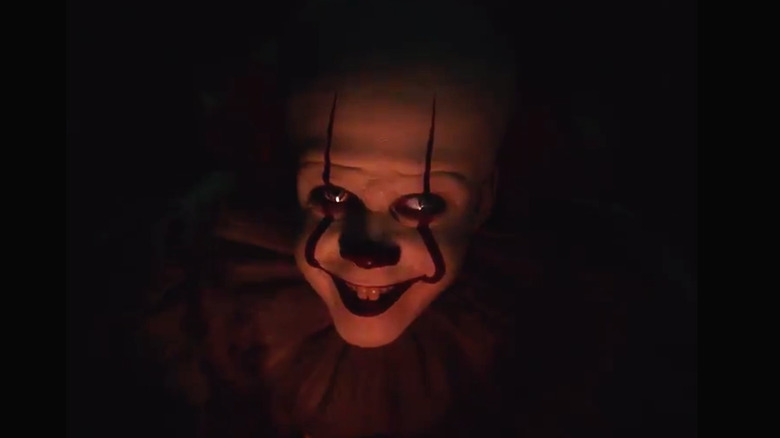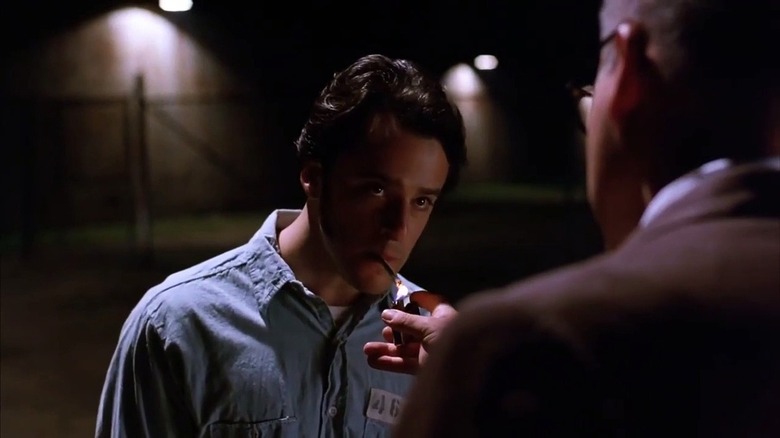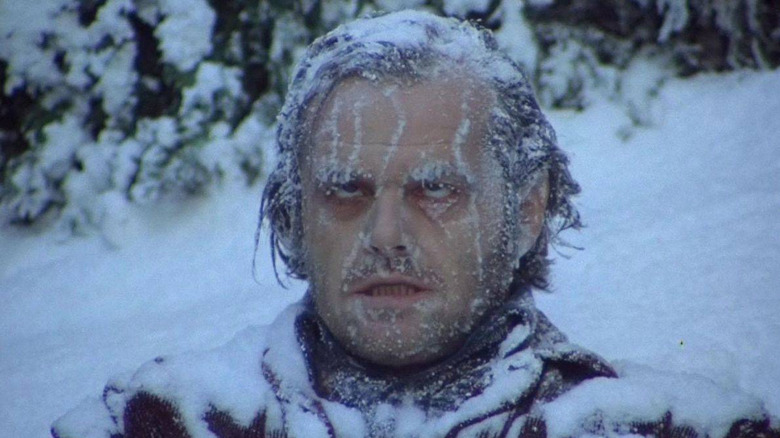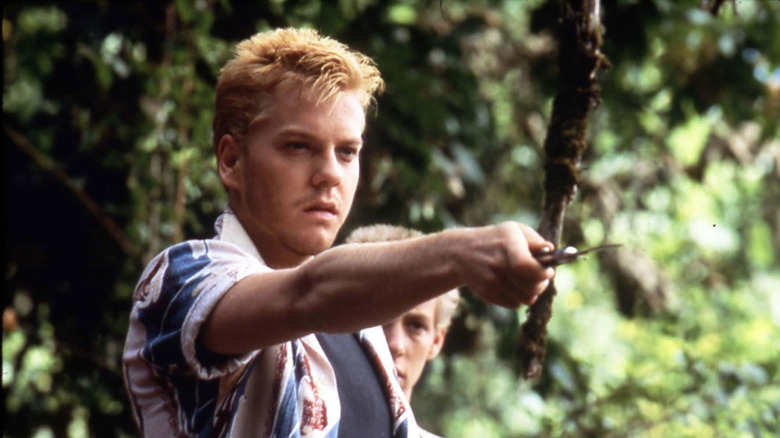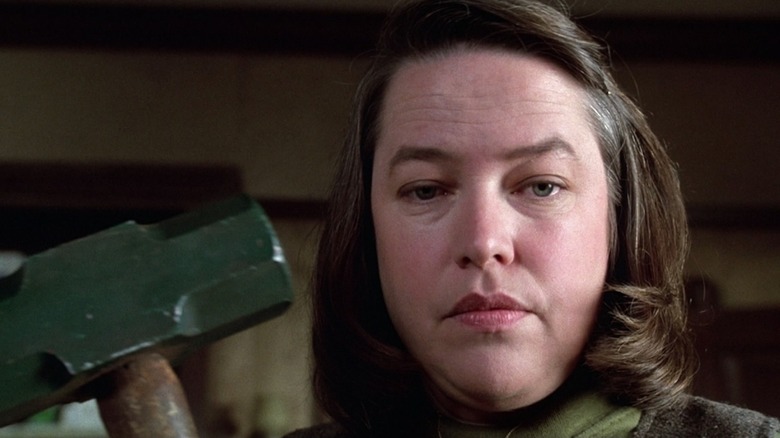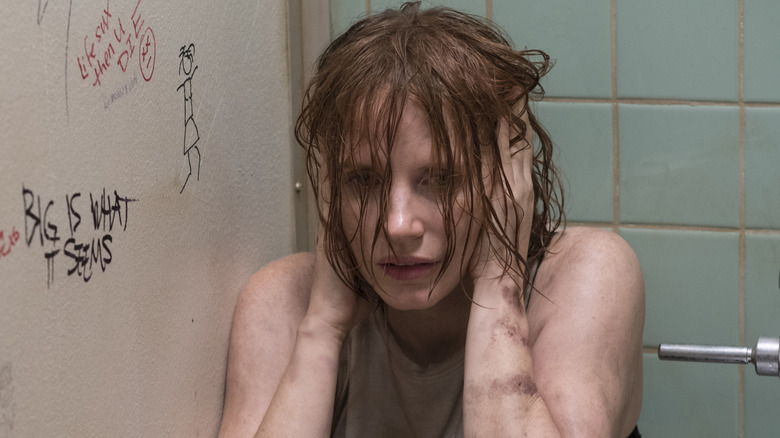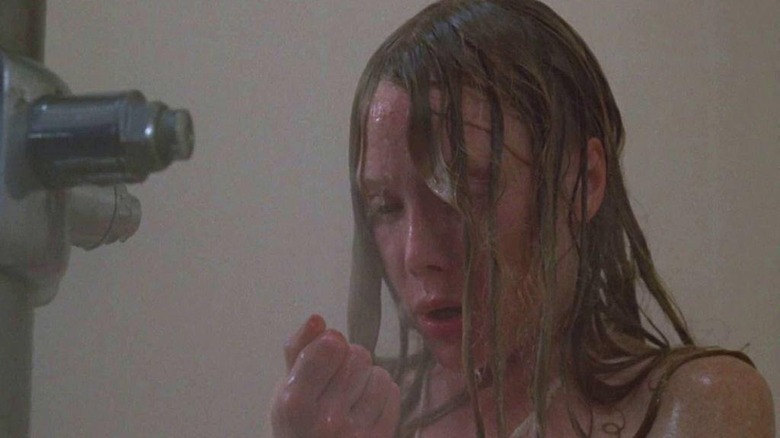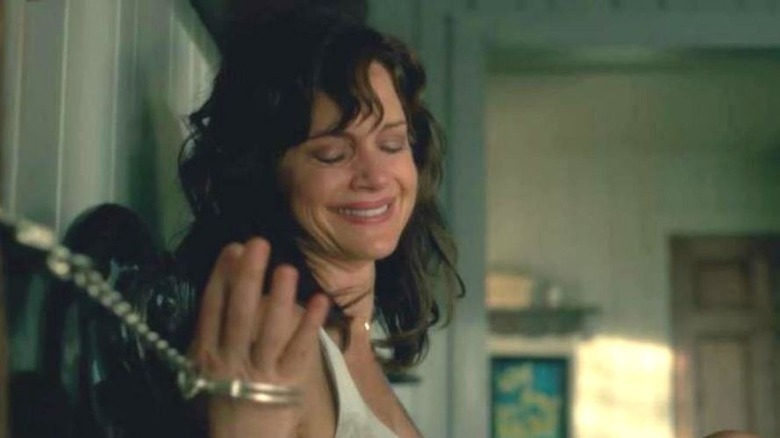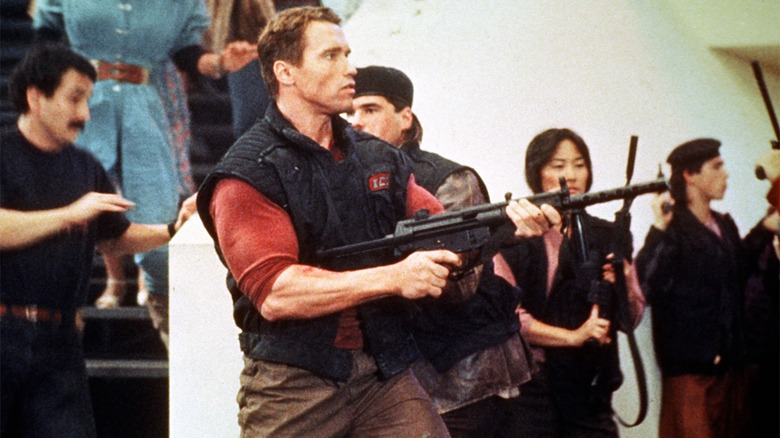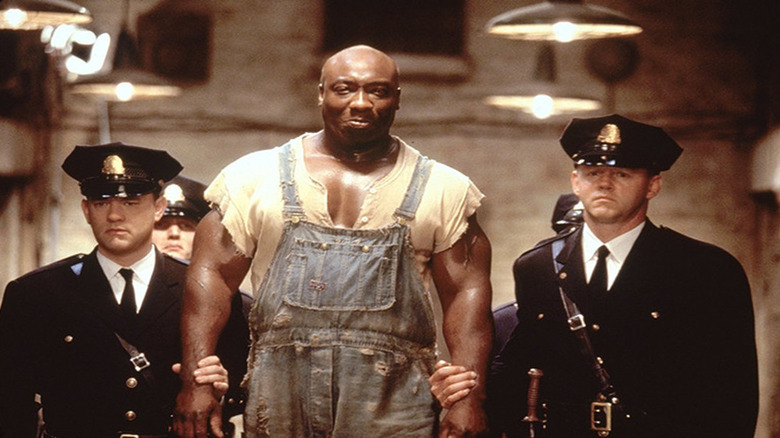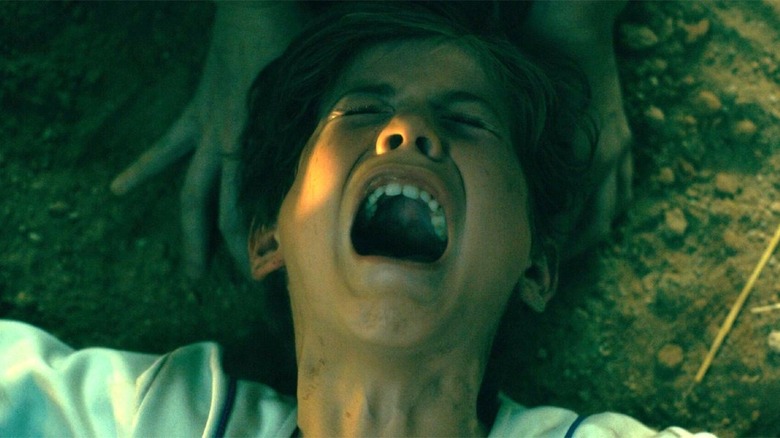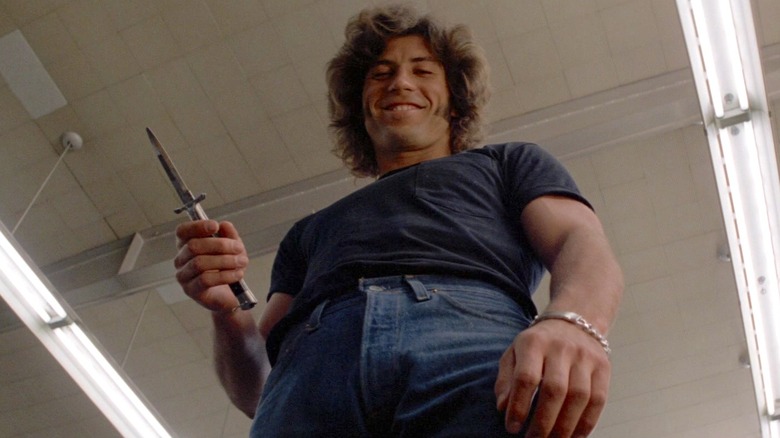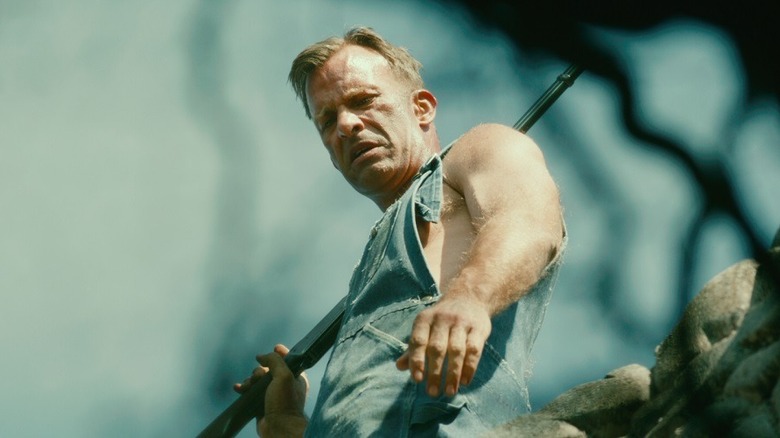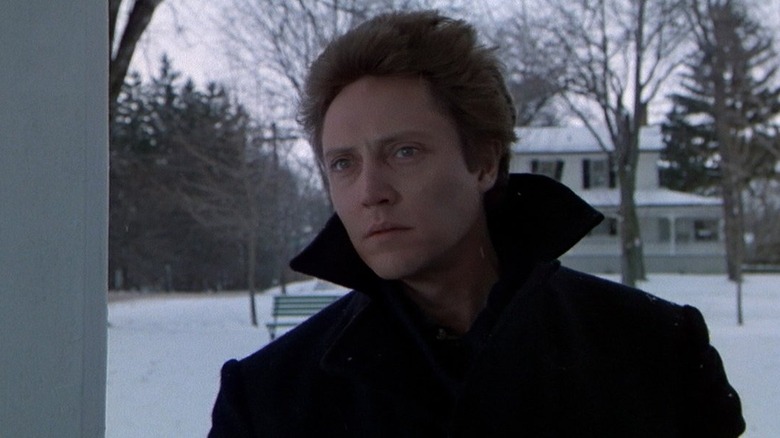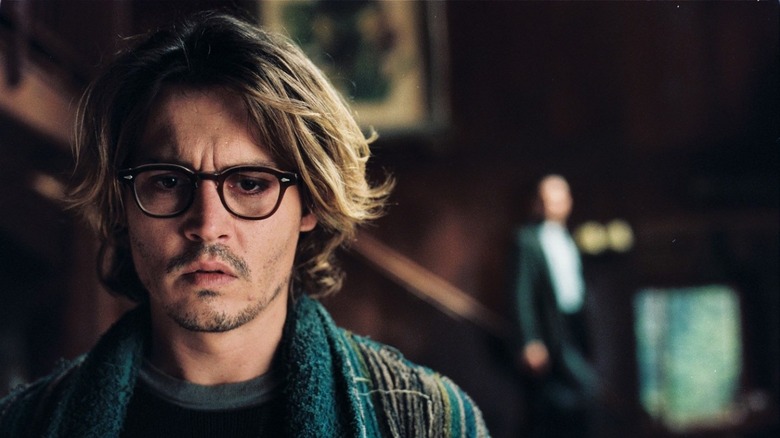Stephen King Movie Moments That Took Things Too Far
The modern film industry is dominated by franchises and previously established properties. It seems like the only projects that are green-lit are those connected to "Star Wars," Marvel, DC, "Harry Potter," "Lord of the Rings," "Game of Thrones," or "Star Trek." However, the work of beloved novelist Stephen King is just as strong of a selling point. King's novels and short stories have inspired countless films and television adaptations. In the streaming era, King has become more popular than ever.
King has had an interesting relationship with his films. While he famously hated Stanley Kubrick's adaptation of "The Shining" because it was nothing like the book, King has had cameo roles in some projects.
King is renowned for his ability to shock readers. As a result, films based on his work have included some truly disturbing moments. Shock value isn't inherently good or bad, but the best King adaptations have tested the audience's comfort level. These Stephen King movie moments took things a little too far.
Tommy's murder — The Shawshank Redemption
"The Shawshank Redemption" isn't just the best Stephen King adaptation ever. It is one of the greatest films ever made. Frank Darabont's beautiful 1994 prison drama offers hope during the most unlikely of circumstances. Darabont does a great job of expanding King's material into a full-length feature film. He adapted King's 1982 novella "Rita Hayworth and the Shawshank Redemption," which was collected in the anthology "Different Seasons."
"The Shawshank Redemption" takes place in a state prison in Portland, Maine. Hapless banker Andy Dufresne (Tim Robbins) is falsely accused of killing his wife and her lover. Despite pleading his innocence and presenting his case, Andy is sentenced to serve two consecutive life sentences. He is completely out of place in jail. Andy's sensitive nature is very different from the brutality of the other prisoners. However, Andy's fellow inmate, Red (Morgan Freeman), shows him sympathy. Andy and Red form a powerful friendship and inspire the other prisoners to not give up hope.
Andy helps different prisoners achieve their personal goals. After burglar Tommy Williams (Gil Bellows) is locked up, Andy helps him complete his education. Tommy is younger than most of the other inmates, and his youthful energy raises their spirits. However, Tommy's fate takes a dark direction as soon as the other characters start accepting him. Merciless prison warden Samuel Norton (Bob Gunton) has him murdered. It is a devastating moment that creates a sense of urgency for Andy and Red to escape.
The ending — The Shining
Stephen King's work has been adapted by many great filmmakers, and Stanley Kubrick may be the best of them all. Kubrick's vision for "The Shining" was vastly different from King's. The original novel shows Jack Torrance's gradual descent into madness. Initially, he is presented as a sympathetic character. However, in Kubrick's film, Jack is mean-spirited from the very beginning. The corrupting influence of the Overlook Hotel only makes him crueler.
The film and book follow the same basic story outline. Jack is a former teacher and would-be writer, who wants to take some time to develop a novel. Jack theorizes that the only way to focus on writing is to bring his family to an isolated location. Jack and his wife, Wendy (Shelly Duvall), and son, Danny (Danny Lloyd), take up residency as the winter caretakers of the Overlook Hotel. In Kubrick's version, Jack begins to show signs of insanity as Danny explores the enigmatic location.
As the hotel corrupts him, Jack starts to lash out at his wife and threatens her. During the intense final moments of the film, Jack chases Wendy and Danny throughout an icy maze. Danny and Wendy ultimately escape, leaving Jack to freeze to death. Nicholson's ferocity makes the sequence even more terrifying.
Ace torments Gordie — Stand by Me
Rob Reiner's 1986 film, "Stand by Me," was also adapted from a novella from the "Different Seasons" collection. "The Body" explores the memories of an author who reminisces on the youthful experiences that inspired him. Although Stephen King is best known for his high-concept fantasy, horror, and science fiction projects, "The Body" is a realistic emotional drama. It's easily among the most mature stories that King has ever written.
"Stand by Me" is told through the author Gordon Lachance's (Richard Dreyfuss) memories. As a pre-teen, Gordon (Will Wheaton) travels on an adventure through the woods with his best friends Chris Chambers (River Phoenix), Teddy Duchamp (Corey Feldman), and Vern Tessio (Jerry O'Connell). Gordon (nicknamed "Gordie") is mourning the loss of his older brother, Denny (John Cusack). Gordie and Dennis had been very close. As the boys set out in search of a mysterious dead body, Gordie begins to process Denny's death. He hasn't been able to reconnect with his parents.
One of the hallmarks of King's work is ruthless bullies. "Stand by Me" does not idealize childhood in any way. Gordie and his friends are tormented by a particularly evil bully, Ace (Kiefer Sutherland). In one of the crueler moments, Ace steals Gordie's Yankees cap. The hat had been a gift from Denny.
Annie hobbles Paul — Misery
One of Stephen King's best skills as an author is how he describes the writing process. King also knows what the consequences of fame are. He has had to deal with more than a few overzealous fans. King's 1987 novel, "Misery," is more relevant than ever before. The story explores how toxic fan culture can lead to violence.
Rob Reiner's 1990 adaptation of "Misery" embodies the same themes of obsession that the novel deals with. The film follows popular romance novelist Paul Sheldon (James Caan), who is rescued from a car accident by an obsessive fan. Annie Wilkes (Kathy Bates) knows Paul's work by heart. She is so dedicated to his stories that she feels like she knows him personally. After she becomes infuriated with the way that Paul decides to conclude his popular novel series, Annie forces him to come up with a new ending. She doesn't permit him to leave until he is finished writing.
Annie goes to extreme lengths to make sure Paul can't leave. Eventually, she slams a sledgehammer against his ankles. It becomes slowly evident what Annie is about to do. Although the scene is not very graphic, Caan captures the anguish that Paul endures.
The bathroom nightmare — IT (2017)
"IT" is one of the most notable works of Stephen King's career. Although he is known for writing quickly, King spent many years developing his iconic killer clown story. The 2017 film "IT" captures the essence of the terror in King's novel. It focuses on how Pennywise embodies the different traumas that all of the kids in the "Losers' Club" are dealing with. Bill (Jaeden Martell) deals with the death of his brother, Ben (Jeremy Ray Taylor) struggles to get over his meekness, Richie (Finn Wolfhard) considers his sexuality, Stanley (Wyatt Olef) wrestles with his Jewish faith, Mike (Chosen Jacobs) explores Derry's secret history, and Eddie (Jack Dylan Grazer) lives in fear of his mother. Encountering Pennywise doesn't just trap the children with a slasher villain. They are forced to grow up very quickly.
Of all of the sequences centered on childhood agony, Beverly's (Sophia Lillis) bathroom nightmare is the most disturbing. It is implied that Beverly is being sexually abused by her father, Alvin (Stephen Bogaert). Pennywise spews Beverly on blood as she copes with puberty.
The shower scene — Carrie (1976)
Brian De Palma is among the most notoriously stylistic filmmakers in Hollywood. He rarely shies away from graphically violent, sexual, and drug-related content. Although De Palma is known to push the boundaries of good taste, he was the perfect choice to helm the adaptation of King's 1974 coming-of-age horror novel, "Carrie." "Carrie" follows a teenage girl (Sissy Spacek) as she discovers her mental powers. Bullied by her peers and abused by her religious zealot mother (Piper Laurie), Carrie goes on a murderous psychokinetic rampage at the prom.
"Carrie" works as an analysis of female sexuality. Carrie is processing how her body is changing at the same time that her powers are revealed. De Palma makes Carrie's self-discovery a moment of body horror. In the opening sequence, Carrie has her first period in her high school's communal shower room. She screams in terror. To make things worse, Carrie's bullies ruthlessly mock her. It's disturbing to watch Spacek capture teenage anxiety in this humiliating moment.
The hand cutting scene — Gerald's Game
Mike Flanagan is one of the few modern filmmakers that understands classic horror. Flanagan doesn't just rely on jump scares. He explores the emotional complexity of his characters. Flanagan's elevated approach to the genre makes him an ideal choice to adapt Stephen King's stories. 2017's "Gerald's Game" is based on the 1992 horror novel of the same name.
"Gerald's Game" analyzes the sexual politics of marriage. After they grow apart, Jessie (Carla Gugino) and Gerald Burlingame (Bruce Greenwood) take a romantic getaway to an isolated cabin to spice up their relationship. Jessie is handcuffed to a bed. However, Gerald suffers a sudden fatal heart attack and collapses. Jessie is forced to free herself. As she lies in the bed and tries to escape, Jessie experiences flashbacks to her dark childhood.
Jessie grows tired and dehydrated as she lies alone. To free herself, Jessie is forced to slice her hand open with a piece of glass. Even for those that can usually stomach the violence in King adaptations, this extended sequence may be too much to handle.
The police massacre civilians — The Running Man
Stephen King's 1982 novel "The Running Man" (which he published under the pseudonym Richard Bachmann) is one of his most politically ambitious stories. Set in a dystopian future, the story imagines that American citizens have become addicted to reality television programming and accept anything that the government tells them. Sound familiar? "The Running Man" feels eerily timely. Even the judicial system is played for entertainment. Convicted prisoners are tried through a brutal futuristic game show called "The Running Man."
In the 1987 film adaptation, Arnold Schwarzenegger stars as police officer Ben Richards. When he flies a helicopter over a food riot in California, Ben watches his fellow officers mercilessly slaughter the protestors. He is shocked and tries to speak up about what he has seen. However, the government edits the security footage to make it looks like Ben committed the murders. Ben is framed, and becomes a contestant on "The Running Man." Although the film has a tongue-in-cheek tone, this moment of police brutality is a little hard to stomach in the wake of recent events.
John Coffey's execution — The Green Mile
After "The Shawshank Redemption," filmmaker Frank Darabont directed another great Stephen King adaptation with his 1999 film, "The Green Mile." Like "The Shawshank Redemption," "The Green Mile" is also a surprisingly inspirational prison drama that focuses on inmates as they cling to hope. The film is told from the perspective of death row prison guard Paul Edgecomb (Tom Hanks).
Paul becomes fascinated by the fate of prisoner John Coffey (Michael Clarke Duncan). Coffey is accused of murdering two young girls. He claims that he was trying to save them from death. The other prisoners begin to discover that Coffey has secret supernatural healing abilities. He heals Paul of a painful bladder infection. Sadly, none of Coffey's powers can save him from his fate.
Coffey's execution comes after the audience has had time to learn about him for over three hours. Duncan's heartbreaking breakout performance is so vulnerable that it grounds the fantasy elements of the story in reality.
Child murder — Doctor Sleep
Given King's comments about Kubrick's adaptation, it seemed unlikely that a sequel to "The Shining" would ever work. The book and film are so wildly different that it would be easy for a sequel to become an awkward mishmash of story beats. However, Mike Flanagan's 2019 adaptation of "Doctor Sleep" manages to honor both Kubrick and King.
King's novel "Doctor Sleep" explores the larger universe of magic users that exists within the same world as "The Shining." An older Danny Torrance (Ewan McGregor) forms a telepathic connection with a powerful girl named Abra Stone (Kyleigh Curran). However, Danny and Abra become the target of the murderous cult of immortal magicians called the True Knot. The True Knot sucks the life force out of their victims to stay alive for eternity.
In one of the most shocking moments in the film, the True Knot's leader, Rose the Hat (Rebecca Ferguson), kidnaps a young boy named Bradley Trevor (Jacob Tremblay) as he walks home from a baseball game. The True Knot ties him up and captures his life force, stealing all of the years that he has yet to live.
The bullies brutalize Arnie — Christine
Of the two Stephen King adaptations that are about murderous cars, "Christine" is much more effective than "Maximum Overdrive." Despite his skills as a writer, King proved with "Maximum Overdrive" that he wasn't quite as talented as a filmmaker. Thankfully, "Christine" was directed by a master of horror. To say that "Christine" is one of John Carpenter's best films is no small statement, considering his extensive filmography.
"Christine's" protagonist, Arnie Cunningham (Keith Gordon), is initially one of King's most likable protagonists. He becomes corrupted by the influence of a haunted car called Christine. Before Arnie goes on a murderous rampage, his situation is easy to empathize with. On his first day of school, Arnie is tormented by a gang of bullies that break his glasses and spill his lunch. King frequently shows the cruelty of bullies, but Buddy Repperton (William Ostrander) is borderline psychopathic. That makes it all the more satisfying when Buddy and his cronies are butchered by Christine.
Wilf murders his wife — 1922
Stephen King's novella "1922" is essentially his version of Edgar Allen Poe's "A Tell-Tale Heart." The horror short was included in King's 2010 anthology "Full Dark, No Stars." Set in Nebraska, the story follows the proud yet reclusive farmer Wilf Leland James (Thomas Jane). Wilf is comfortable on the farm and likes to keep to himself. However, the farm belongs to his wife, Arlette (Molly Parker). Arlette decides that she wants to sell her property, and move to Omaha with her son, Henry (Dylan Schmid). Wilf resists her suggestion. He insists that "cities are for fools."
Wilf realizes that Molly has her mind set on leaving their rural lifestyle behind. He grows furious. Molly's control of the property threatens his masculinity. To take ownership of the farm, Wilf murders Arlette and dumps her body down a well. She is devoured by rats. What makes the scene even more challenging to watch is that Wilf convinces his son to assist him. Both Wilf and Henry experience haunting visions that remind them of their murderous actions.
Johnny's sacrifice — The Dead Zone
"The Dead Zone" is another Stephen King story that feels a little too close to current events. Sometimes, the themes that King addresses are even scarier than the brutal moments. David Cronenberg's 1983 adaptation of "The Dead Zone" works as both a horror movie and a political thriller. It addresses electioneering, nuclear holocaust, and the oppressive right-wing policies of the Reagan era.
In Castle Rock, New Hampshire, kindly school teacher Johnny Smith (Christopher Walken) gets into a serious car accident that leaves him in a coma for five years. When Johnny wakes up, he realizes that he can see the details of people's lives, including their pasts and futures, by touching them. Johnny is asked by Sheriff George Bannerman (Tom Skeritt) to help the police investigate a serial killer.
However, Johnny begins to uncover a political conspiracy that threatens the entire country. After attending a campaign event for the third-party United States Senate candidate, Greg Stillson (Martin Sheen), Johnny learns that Stillson plans to start a nuclear war. Although Johnny successfully averts the crisis, he sacrifices himself to stop Stillson. Johnny's death isn't particularly violent, but it is very sad.
The hate crime — IT Chapter Two
The recent adaptation of "IT" had to overcome the inherent problems with the source material. While the segments featuring the children in "IT" are very compelling, the ending, featuring the grown-up members of the Losers' Club isn't very satisfying. 2017's "IT" focuses entirely on the children, and 2019's "IT Chapter Two" follows the adult characters. "IT Chapter Two" overcame the book's weaknesses by exploring the societal evils in Derry. Pennywise's influence has spread throughout the town.
The sequel opens with a sickening act of violence that is strikingly realistic compared to the over-the-top Pennywise scenes. A gay man named Adrian Mellon (Xavier Dolan) and his boyfriend, Don Hagarty (Taylor Frey), are assaulted by a gang of homophobic bullies outside a carnival. The scene establishes the evil that the Losers' Club must face when they return home. The violence at the carnival foreshadows Bill's (James McAvoy) return to the fair later in the film.
Mort eludes justice — Secret Window
As with "Misery," "The Shining," and "Stand by Me," "Secret Window" allowed Stephen King to reflect on the writing process. His 1990 novella, "Secret Window, Secret Garden," explores the horror that authors feel when they are accused of plagiarism. Johnny Depp stars as Mort Rainey, a mystery writer who lives alone in a log cabin outside of New York City. After he discovers that his wife, Amy (Maria Bello), is cheating on him, Mort becomes a recluse.
Mort is visited by a mysterious stranger named John Shooter (John Turturro) who accuses him of stealing story ideas. After the local police report a series of murders, Mort suspects that Shooter may be involved with the crimes. However, the film's final moments reveal that Shooter is an alternate personality belonging to Mort. Shooter allows Mort to unleash his murderous intentions. He brutally kills Amy and her lover and escapes from justice.
